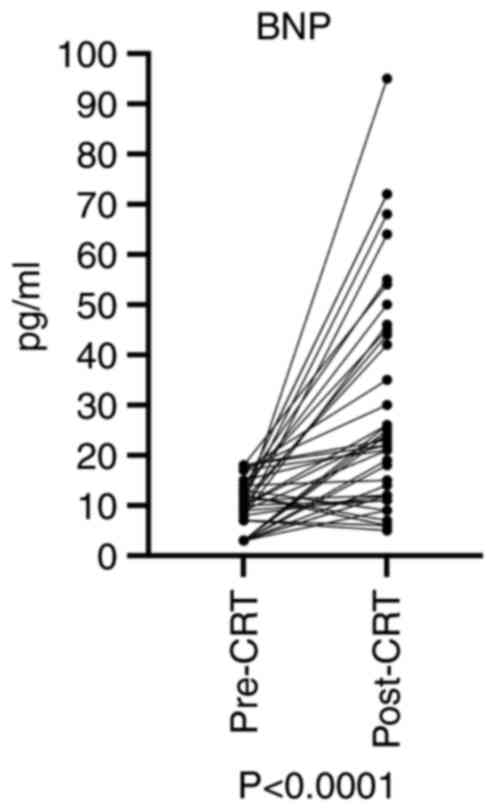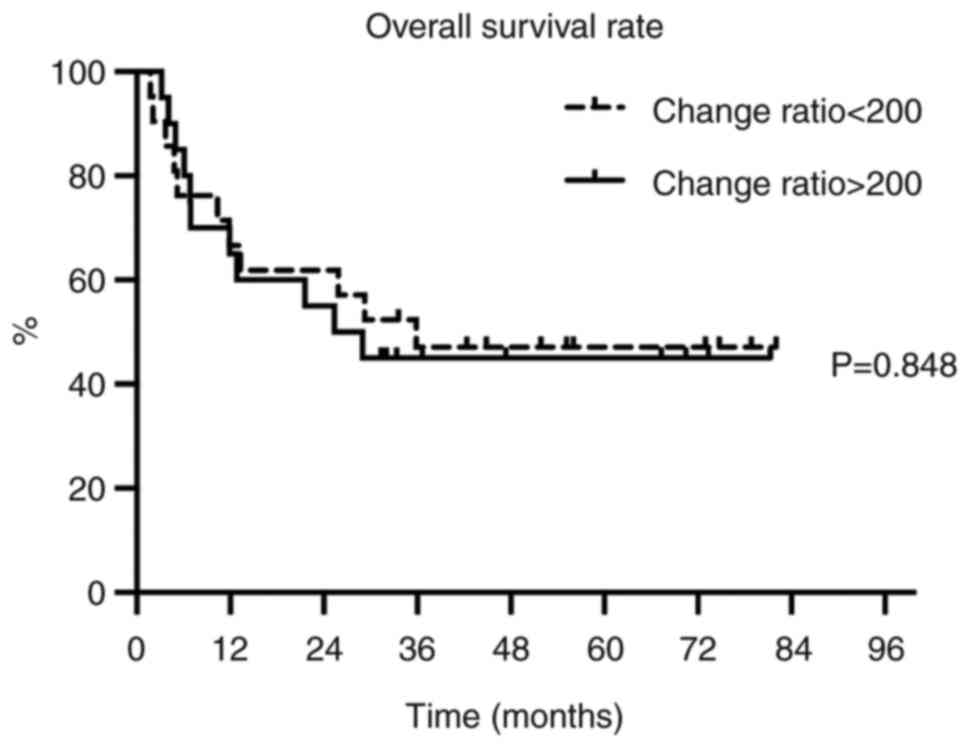|
1
|
Herskovic A, Martz K, Al-Sarraf M,
Leichman L, Brindle J, Vaitkevicius V, Cooper J, Byhardt R, Davis L
and Emami B: Combined chemotherapy and radiotherapy compared with
radiotherapy alone in patients with cancer of the esophagus. N Engl
J Med. 326:1593–1598. 1992. View Article : Google Scholar : PubMed/NCBI
|
|
2
|
Kato K, Nakajima TE, Ito Y, Katada C,
Ishiyama H, Tokunaga SY, Tanaka M, Hironaka S, Hashimoto T, Ura T,
et al: Phase II study of concurrent chemoradiotherapy at the dose
of 50.4 Gy with elective nodal irradiation for stage II–III
esophageal carcinoma. Jpn J Clin Oncol. 43:608–615. 2013.
View Article : Google Scholar : PubMed/NCBI
|
|
3
|
Darby SC, Cutter DJ, Boerma M, Constine
LS, Fajardo LF, Kodama K, Mabuchi K, Marks LB, Mettler FA, Pierce
LJ, et al: Radiation-related heart disease: Current knowledge and
future prospects. Int J Radiat Oncol Biol Phys. 76:656–665. 2010.
View Article : Google Scholar : PubMed/NCBI
|
|
4
|
Gagliardi G, Constine LS, Moiseenko V,
Correa C, Pierce LJ, Allen AM and Marks LB: Radiation dose-volume
effects in the heart. Int J Radiat Oncol Biol Phys. 76 (3
Suppl):S77–S85. 2010. View Article : Google Scholar : PubMed/NCBI
|
|
5
|
Sardaro A, Petruzzelli MF, D'Errico MP,
Grimaldi L, Pili G and Portaluri M: Radiation-induced cardiac
damage in early left breast cancer patients: Risk factors,
biological mechanisms, radiobiology, and dosimetric constraints.
Radiother Oncol. 103:133–142. 2012. View Article : Google Scholar : PubMed/NCBI
|
|
6
|
Correa CR, Litt HI, Hwang WT, Ferrari VA,
Solin LJ and Harris EE: Coronary artery findings after left-sided
compared with right-sided radiation treatment for early-stage
breast cancer. J Clin Oncol. 25:3031–3037. 2007. View Article : Google Scholar : PubMed/NCBI
|
|
7
|
Rutqvist LE, Lax I, Fornander T and
Johansson H: Cardiovascular mortality in a randomized trial of
adjuvant radiation therapy versus surgery alone in primary breast
cancer. Int J Radiat Oncol Biol Phys. 22:887–896. 1992. View Article : Google Scholar : PubMed/NCBI
|
|
8
|
Gyenes G, Rutqvist LE, Liedberg A and
Fornander T: Long-term cardiac morbidity and mortality in a
randomized trial of pre- and postoperative radiation therapy versus
surgery alone in primary breast cancer. Radiother Oncol.
48:185–190. 1998. View Article : Google Scholar : PubMed/NCBI
|
|
9
|
Cowie MR, Struthers AD, Wood DA, Coats AJ,
Thompson SG, Poole-Wilson PA and Sutton GC: Value of natriuretic
peptides in assessment of patients with possible new heart failure
in primary care. Lancet. 350:1349–1353. 1997. View Article : Google Scholar : PubMed/NCBI
|
|
10
|
Maisel AS, Krishnaswamy P, Nowak RM,
McCord J, Hollander JE, Duc P, Omland T, Storrow AB, Abraham WT, Wu
AH, et al: Rapid measurement of B-type natriuretic peptide in the
emergency diagnosis of heart failure. N Engl J Med. 347:161–167.
2002. View Article : Google Scholar : PubMed/NCBI
|
|
11
|
Feng M, Moran JM, Koelling T, Chughtai A,
Chan JL, Freedman L, Hayman JA, Jagsi R, Jolly S, Larouere J, et
al: Development and validation of a heart atlas to study cardiac
exposure to radiation following treatment for breast cancer. Int J
Radiat Oncol Biol Phys. 79:10–18. 2011. View Article : Google Scholar : PubMed/NCBI
|
|
12
|
National Cancer Institute NIH, US
Department of Health and Human Sevices (2009), . Common terminology
criteria for adverse events. version 4.0. https://evs.nci.nih.gov/ftp1/CTCAE/CTCAE_4.03/CTCAE_4.03_2010-06-14_QuickReference_8.5×11.pdfJuly
7–2023
|
|
13
|
Wondergem J, Strootman EG, Frölich M, Leer
JW and Noordijk EM: Circulating atrial natriuretic peptide plasma
levels as a marker for cardiac damage after radiotherapy. Radiother
Oncol. 58:295–301. 2001. View Article : Google Scholar : PubMed/NCBI
|
|
14
|
Wondergem J, Persons K, Zurcher C, Frölich
M, Leer JW and Broerse J: Changes in circulating atrial natriuretic
peptide in relation to the cardiac status of Rhesus monkeys after
total-body irradiation. Radiother Oncol. 53:67–75. 1999. View Article : Google Scholar : PubMed/NCBI
|
|
15
|
Kruse JJ, Strootman EG, Bart CI, Visser A,
Leer JW and Wondergem J: Radiation-induced changes in gene
expression and distribution of atrial natriuretic peptide (ANP) in
different anatomical regions of the rat heart. Int J Radiat Biol.
78:297–304. 2002. View Article : Google Scholar : PubMed/NCBI
|
|
16
|
Jingu K, Nemoto K, Kaneta T, Oikawa M,
Ogawa Y, Ariga H, Takeda K, Sakayauchi T, Fujimoto K, Narazaki K,
et al: Temporal change in brain natriuretic peptide after
radiotherapy for thoracic esophageal cancer. Int J Radiat Oncol
Biol Phys. 69:1417–1423. 2007. View Article : Google Scholar : PubMed/NCBI
|
|
17
|
Nishiyama K, Tsutamoto T, Yamaji M,
Kawahara C, Fujii M, Yamamoto T and Horie M: Biological variation
of brain natriuretic peptide and cardiac events in stable
outpatients with nonischemic chronic heart failure. Circ J.
75:341–347. 2011. View Article : Google Scholar : PubMed/NCBI
|
|
18
|
Masson S and Latini R: Amino-terminal
pro-B-type natriuretic peptides and prognosis in chronic heart
failure. Am J Cardiol. 101:56–60. 2008. View Article : Google Scholar : PubMed/NCBI
|
|
19
|
Palumbo I, Palumbo B, Fravolini ML,
Marcantonini M, Perrucci E, Latini ME, Falcinelli L, Sabalich I,
Tranfaglia C, Schillaci G, et al: Brain natriuretic peptide as a
cardiac marker of transient radiotherapy-related damage in
left-sided breast cancer patients: A prospective study. Breast.
25:45–50. 2016. View Article : Google Scholar : PubMed/NCBI
|
|
20
|
Ishikura S, Nihei K, Ohtsu A, Boku N,
Hironaka S, Mera K, Muto M, Ogino T and Yoshida S: Long-term
toxicity after definitive chemoradiotherapy for squamous cell
carcinoma of the thoracic esophagus. J Clin Oncol. 21:2697–2702.
2003. View Article : Google Scholar : PubMed/NCBI
|
|
21
|
Watanabe M, Tachimori Y, Oyama T, Toh Y,
Matsubara H, Ueno M, Kono K, Uno T, Ishihara R, Muro K, et al:
Comprehensive registry of esophageal cancer in Japan, 2013.
Esophagus. 18:1–24. 2021. View Article : Google Scholar : PubMed/NCBI
|
|
22
|
Watanabe M, Toh Y, Ishihara R, Kono K,
Matsubara H, Murakami K, Muro K, Numasaki H, Oyama T, Ozawa S, et
al: Comprehensive registry of esophageal cancer in Japan, 2014.
Esophagus. 19:1–26. 2022. View Article : Google Scholar : PubMed/NCBI
|
|
23
|
Kato H, Sato A, Fukuda H, Kagami Y,
Udagawa H, Togo A, Ando N, Tanaka O, Shinoda M, Yamana H and
Ishikura S: A phase II trial of chemoradiotherapy for stage I
esophageal squamous cell carcinoma: Japan Clinical Oncology Group
Study (JCOG9708). Jpn J Clin Oncol. 39:638–643. 2009. View Article : Google Scholar : PubMed/NCBI
|
|
24
|
Lund M, Alexandersson von Döbeln G,
Nilsson M, Winter R, Lundell L, Tsai JA and Kalman S: Effects on
heart function of neoadjuvant chemotherapy and chemoradiotherapy in
patients with cancer in the esophagus or gastroesophageal
junction-a prospective cohort pilot study within a randomized
clinical trial. Radiat Oncol. 10:162015. View Article : Google Scholar : PubMed/NCBI
|
|
25
|
Zhang Z and Zhang H: Impact of neoadjuvant
chemotherapy and chemoradiotherapy on postoperative cardiopulmonary
complications in patients with esophageal cancer. Dis Esophagus.
30:1–7. 2007. View Article : Google Scholar
|
|
26
|
Plana JC, Galderisi M, Barac A, Ewer MS,
Ky B, Scherrer-Crosbie M, Ganame J, Sebag IA, Agler DA, Badano LP,
et al: Expert consensus for multimodality imaging evaluation of
adult patients during and after cancer therapy: A report from the
American Society of Echocardiography and the European Association
of Cardiovascular Imaging. J Am Soc Echocardiogr. 27:911–939. 2014.
View Article : Google Scholar : PubMed/NCBI
|
|
27
|
Jordan JH, Vasu S, Morgan T, D'Agostino RB
Jr, Meléndez GC, Hamilton CA, Arai AE, Liu S, Liu CY, Lima JA, et
al: Anthracycline-associated T1 mapping characteristics are
elevated independent of the presence of cardiovascular
comorbidities in cancer survivors. Circ Cardiovasc Imaging.
9:e0043252016. View Article : Google Scholar : PubMed/NCBI
|


















